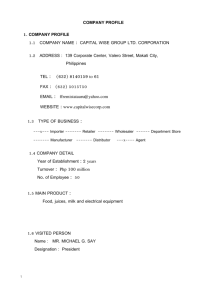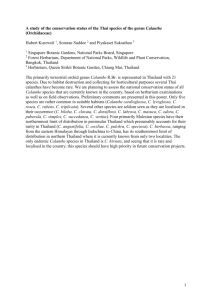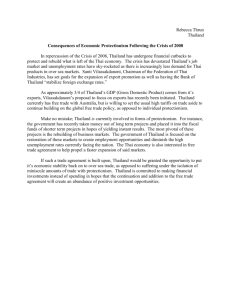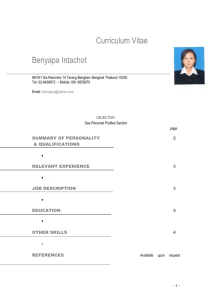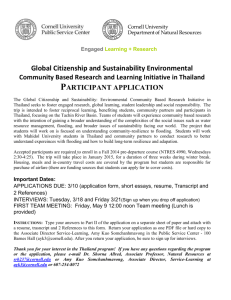DBA-Business lecture series-Pathathai Sinliamthong
advertisement
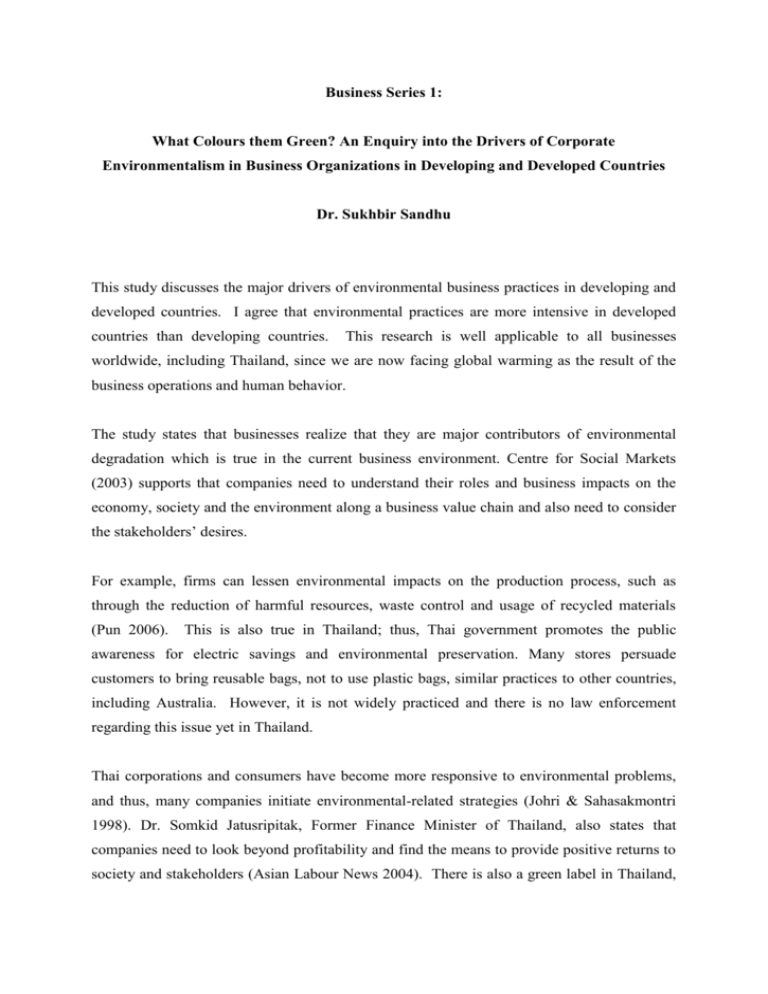
Business Series 1: What Colours them Green? An Enquiry into the Drivers of Corporate Environmentalism in Business Organizations in Developing and Developed Countries Dr. Sukhbir Sandhu This study discusses the major drivers of environmental business practices in developing and developed countries. I agree that environmental practices are more intensive in developed countries than developing countries. This research is well applicable to all businesses worldwide, including Thailand, since we are now facing global warming as the result of the business operations and human behavior. The study states that businesses realize that they are major contributors of environmental degradation which is true in the current business environment. Centre for Social Markets (2003) supports that companies need to understand their roles and business impacts on the economy, society and the environment along a business value chain and also need to consider the stakeholders’ desires. For example, firms can lessen environmental impacts on the production process, such as through the reduction of harmful resources, waste control and usage of recycled materials (Pun 2006). This is also true in Thailand; thus, Thai government promotes the public awareness for electric savings and environmental preservation. Many stores persuade customers to bring reusable bags, not to use plastic bags, similar practices to other countries, including Australia. However, it is not widely practiced and there is no law enforcement regarding this issue yet in Thailand. Thai corporations and consumers have become more responsive to environmental problems, and thus, many companies initiate environmental-related strategies (Johri & Sahasakmontri 1998). Dr. Somkid Jatusripitak, Former Finance Minister of Thailand, also states that companies need to look beyond profitability and find the means to provide positive returns to society and stakeholders (Asian Labour News 2004). There is also a green label in Thailand, entitled “Thai Green Label”; Thai Green Label awards introduced in August 1994 by the Thailand Environment Institute given to products having minimum environmental impacts. In conclusion, this study holds true for the environmental consciousness and practices in Thailand. Social responsibility practices have been voluntary progressed in Thailand. Stakeholder theory is also practiced in Thailand as Thai corporations consider the demand from various stakeholders. For example, they consider the wellbeing of customers, employees, trading partners, shareholders, etc. However, environmental regulations in Thailand are not yet strong. Some companies may not pay attention to the environmental problems. Thus, Thai government should impose more stringent environmental regulations. Business Series 2: The Relationship between Management Control System and Strategy in Not-for-Profit Sector Dr. Basil Tucker & Lee Parker This study focuses on the relationship between management control system (MCS) and strategy in not-for-profit (NFP) organizations. MCS is considered as one of the important mechanisms of organizations, for profit and NFP organizations. MCS has been utilized as quality control mechanisms by many corporations in Thailand as well. However, MCS is practiced more widely in profit oriented organizations, rather than NFP organizations. This study did not specify any types of MCS applied in NFP organizations. Thus, it is difficult to get a clear picture regarding the type of MCS applied by NFP organizations. In practice, MCS can be employed in many departments within the organizations such as human resources and finance to measure the firms’ performance in order to appropriately allocate resources. Anthony (2007) mentions that MCS provides a mechanism for the firm’s managers to induce corporate strategies in order to reach its objectives. In Thailand, many organizations employ MCS with respect to balanced score card, total quality management (TQM) and just-in-time (JIT), for both formal and informal practices. In general, if there is no regulatory control or requirements imposed by the government, trading partners or other stakeholders, the MCS tends to be practiced informally. This study discovers that the MCS is used to measure the end result which is the overall performance of the organization but not used for resource allocation. Besides, corporate strategies are not considered when designing MCS. I think this is also true in Thai corporations; most corporations focus more on performance based evaluation. High performing departments within the organizations may not be given high resource allocation. The strategic decisions mainly derive from the top management within the Thai organizations and MCS should be in line with its corporate strategies. In conclusion, I think that MCS is one of the important tools for any organization. However, it may be applied more heavily in profit organizations, rather than NFP organizations. Companies need to decide the type of MCS tools that are appropriate for their organizations. Then, they need to apply and evaluate MCS correctly and effectively. Business Series 3: A Cross Country Study of the Determinants of Sustainability Reporting and Assurance Dr. Roger Burritt and Dr. Paul Shum It is true that there is an increasing demand for sustainability reports, especially in developed countries. There is also a growing interest in producing sustainability reports in developing country, including Thailand. However, the intensity of sustainability reports in Thailand is still very limited since there is no regulatory requirement to produce sustainability reports. Some big companies in Thailand produce sustainability reports separately from their financial reports, entitled corporate social responsibility (CSR) reports. Assurance of the accuracy of the information is also a problematic area in Thailand which is consistent with this study. The main purpose of producing reports is public relation. Thus, companies may tend to report more information than the actual practices. Similar to this study, investors in Thailand do not express strong demand for sustainability reports since they tend to be profit oriented. However, the Stock Exchange of Thailand (SET) has established the guidelines for good governance for Thai listed companies to promote good corporate practices. The Good Governance Center was established in 2002 to help listed companies to develop good governance system. SET also initiated good corporate governance awards for firms that meet the criteria. This may help ensure the quality and the accuracy of sustainability reports. This study also mentions about the agency theory stating that the accredited auditors help improve the accuracy of sustainability reports. However, there are still problems regarding the professional ethics of auditing companies. For example, Arthur Andersen, a well-known accounting firm, has also been accused for providing wrong information to the public for companies, such as Enron and WorldCom, resulting in the bankruptcy of these companies. This study also reveals that public has increased demand in social and environmental concern. They integrate social and environmental performance, besides economic performance, into consideration when they evaluate the firms’ performance. I strongly agree with this study that credibility and assurance of the reports is very important for stakeholders to utilize the information in order to correctly evaluate the firms’ performance. In addition, a non-profit organization was established, Thailand Business Council for Sustainable Development (TBCSD), in November 1993, by Mr. Anand Panyarachun, a former Prime Minister of Thailand, with the main purpose to elevate environmental consciousness aiming to reach sustainability. This shows that many organizations in Thailand place more concern on sustainable development. In conclusion, sustainability reports can be one of the important tools for stakeholders to evaluate the performance of the firms. However, the readers of sustainability reports need to make appropriate judgment about the accuracy of the reports. One way to help protect malfunctions of the markets and ensure the accuracy of the published data is the regulation. Therefore, sustainability reports should be regulated. Business Series 4 Laws of Growth Byron Sharp This study discusses that existing theories may not hold true in the practical world. The theories without supporting laws seem to be wrong. The study reveals that the laws of marketing provide ‘meaning to metrics’ because they are based on the real observations of consumer behavior. This study provides valuable ground theories, such as double jeopardy, polygamous loyalty, duplication of purchase law, 60/20, to support consumer behaviors which are very valuable and practical for the interested parties. Theories state that big brands generally have more customers and more customer royalty; thus, they have more market share. However, in reality, the study shows that small brands have equal market share as big brands. Thus, loyalty is not much different among big and small brands. I think that this may not be absolutely true in Thailand as Thai customers seem to have high brand royalty towards products, especially products that are related to their five necessities and products are not homogeneous in nature. Thai customers tend to be repeated buyers if the products offer them enough satisfactory e.g. taste, prestige, etc. However, if products can be easily substituted, Thai customers may switch brands for their convenience which is consistent with the finding of this study. Further, some theories stipulate that companies can gain more sales by retaining customers and maintaining customer royalty. However, the findings reveal that the growth of customers does not derive from customer royalty. It also discloses that acquiring new customers is cheaper than retaining existing customers. I believe that Thai companies generally focus more on maintaining customers by creating brand awareness and brand royalty. Attracting new customers usually applies when companies launch new product lines. According to the theories, big brands can retain more customers. However, in the real world, all brands can lose customers; smaller brands tend to lose more customers. I believe that this is true in Thailand. The study reveals that mass marketing is more important than target marketing. If the companies want to grow, they need to aim at ‘light buyers, more medium buyers and few more heavy buyers’. Thus, companies should try to do mass marketing to reach the targeted growth and maintain market share. I believe that if the products are homogeneous, this holds true. If not, it may not be true in Thailand. In conclusion, based on the findings of this study, companies, practitioners and marketers need to think twice when applying existing theories into practices. What states in the theories may not hold true in reality. Thus, they need to clearly understand consumer behavior to accurately position themselves or initiate new strategic plans. Business Series 5 HR and the Line: Devolving People Management Activities to Line Managers Carol T. Kulik Many organizations have changed the ways they manage people in their organizations. This study discusses about the relationship between devolution and effectiveness (People Management Effectiveness: PME). Devolution refers to decentralizing HR activities to line managers. Devolution trends include remuneration, performance management, promotion, recruitment, HR planning, training career development, job design, coaching, succession planning, leadership development, culture, industrial relations, etc. There is the same evidence in the organization where I teach, a reputed private university. For example, activities such as performance management, remuneration, and promotion are proposed by the line manager, immediate boss, chairpersons responsible for the respective departments, because they are the ones who evaluate teaching performance and they know their subordinates better than anyone else. Recruitment is conducted by a panel of line managers from different departments which I believe this method yields a better PME. The reason is that chairpersons have more knowledge in job description and experts in the academic areas; thus, they can effectively recruit new qualified faculty members and place them in the right job. Career path and succession planning are also proposed by the chairperson and approved by the president of the university. Job design and coaching is a responsibility of the chairperson who can assign coordinators to assist in this matter. In conclusion, I agree that devolution with line manager’ support can lead to PME. In Thailand, many activities are outsourced such as training and organizational culture development. However, I disagree that devolution enhance HR reputation. The success of the department, under a particular faculty, does not depend on HRM. It is due to the effectiveness of the line managers, chairpersons, who take good care of the departments. Thus, I agree that PME is increased when there is less HR involvement. HR activities include functions that involve all people within the university, for example, a faculty annual seminar. I strongly believe that whether or not to adopt devolution depends largely on the decision of the top management of the organizations. References Centre for Social Markets (CSM) 2003, Giving something back: social responsibility and South Asian businesses in the United Kingdom: an exploratory study, viewed 15 November 2007, <http://www.csmworld.org/public/balcdCSMGiving%20Something%20Back%20report.pdf >. Pun, KF 2006, ‘Determinants of environmentally responsible operations: a review’, International Journal of Quality and Reliability Management, vol. 23, no. 3, pp. 279–297. Johri, LM & Sahasakmontri, K 1998, ‘Green marketing of cosmetics and toiletries in Thailand’, The Journal of Consumer Marketing, vol. 15, no. 3, p. 265–275. Asian Labour News 2004, Thailand: CSR as philanthropy?, 13 July, viewed 1 March 2005, <http://www.asianlabour.org/archives/001818.php>. Anthony, R. and Govindarajan, V., 2007. Management Control Systems, Chicago, Mc-GrawHill IRWIN.

